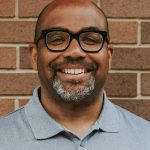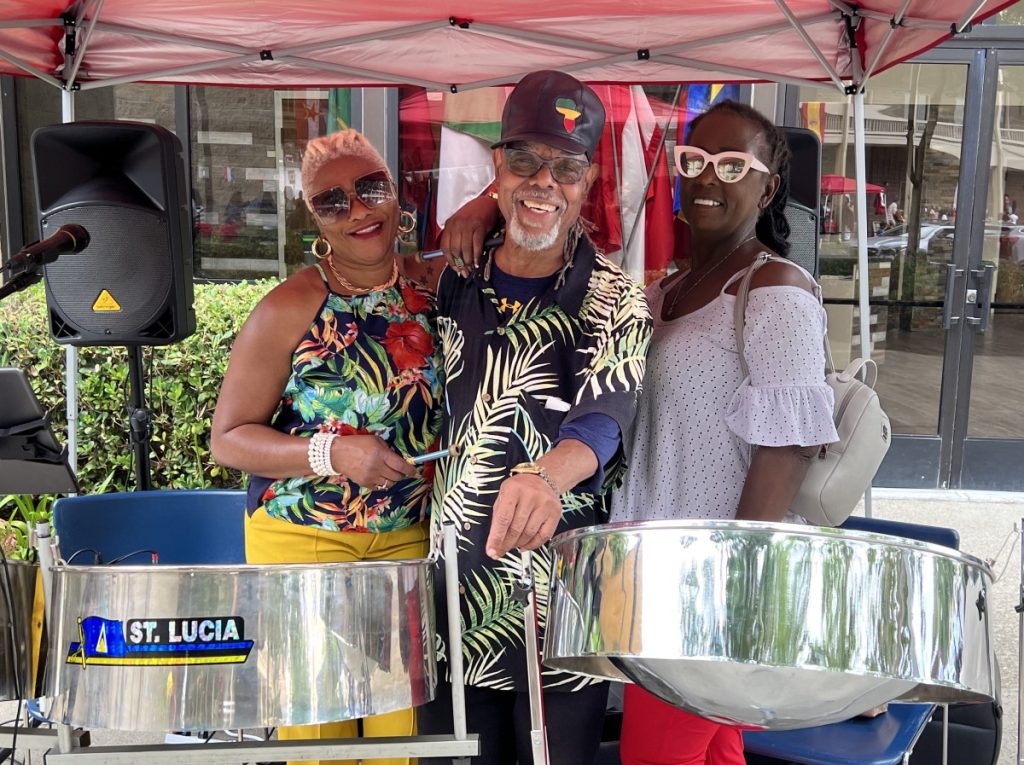And Jesus came up and spoke to them, saying, “All authority in heaven and on earth has been given to Me. Go, therefore, and make disciples of all the nations, baptizing them in the name of the Father and the Son and the Holy Spirit, teaching them to follow all that I commanded you; and behold, I am with you always, to the end of the age.” (Matthew 28:18–20 NASB)
 During my years in pastoral ministry, I sought to keep before my congregation the charge to the church that Jesus gave his followers at the end of his earthly ministry: make disciples of all the nations. That mandate has not changed. The NAB has a rich history and current passion to take the Gospel to the nations, seeking to live out this command. And yet, when Jesus cast that vision, he said go to the nations. What about when the nations come to us?
During my years in pastoral ministry, I sought to keep before my congregation the charge to the church that Jesus gave his followers at the end of his earthly ministry: make disciples of all the nations. That mandate has not changed. The NAB has a rich history and current passion to take the Gospel to the nations, seeking to live out this command. And yet, when Jesus cast that vision, he said go to the nations. What about when the nations come to us?
Addressing this question was on the mind of Dr. Marc Maffucci when he became the pastor of Quail Lakes Baptist Church in Stockton, California, in 2001. He noticed diversity in the city, but the attendance at Quail didn’t represent the community around the church. He told the leaders, “You’re in a mission field, but there are parts of that field that I don’t see in the church.”
So he asked the question: how do we make Quail look like the community? Church leadership began taking intentional steps to reach the representatives of the nations that surrounded the local congregation. Specifically, Dr. Maffucci began teaching on ethnic diversity and developing deliberate friendships, and the church leadership created a program to serve the community, intentionally selected leaders that reflect the community, and celebrated the ethnic diversity of Quail.
In his teaching and leading, Dr. Maffucci emphasized the value of ethnic diversity in the church as representing the Kingdom values of Christ. He established the theological truth that the foundational identity of a Christian is in Christ, not in ethnicity, race, gender, or nationality. Not that these distinctives go away, but rather the local expression of the church is enhanced by ethnic diversity unified in Jesus Christ.
He developed a friendship with a local African American pastor, which led to their churches planning and participating in joint activities together in various ministries, including a pulpit swap and praying together. He also saw the impact on his own congregation from participating in joint fellowship.
Quail established a program called Go Lift Every Church, in which they send teams of volunteers to help under-resourced Stockton churches, primarily churches of color, with projects such as painting and remodeling. This service had an impact on Quail internally as it mobilized teams of people to engage with many different types of churches in Stockton. It also had an impact on Quail’s image in the community as a safe and even welcoming place. Serving other churches also reflects the Kingdom-first mentality Dr. Maffucci seeks to establish at Quail.
Dr. Maffucci made intentional leadership decisions, seeing it as important to get ethnically diverse people into leadership roles as more people of color were attending the church. Some of the ministries in which Quail members were engaged served as development opportunities for subsequent church leadership positions.
 There is a saying at Quail: “Whatever you celebrate, you are going to get more of.” Another way to reach their diverse community was to celebrate the ethnicities that make up Quail. I attended their most recent Tapestry of Quail, a celebration started about ten years ago designed to highlight the food and cultures of the many ethnicities represented at Quail. The vibrant flags, the displays of different cultures, the colorful garb worn by many participants, the steel drum music playing in the background – all were a celebration of Christ’s redeeming power over the nations. As we looked at the eighteen ethnicities represented by booths, Dr. Maffucci noted to me that we are reminded of Christ’s command to go into all the Earth, making disciples. The nations are not only out there, they are also right here in Stockton, he said. And they are represented in joyful and loving community.
There is a saying at Quail: “Whatever you celebrate, you are going to get more of.” Another way to reach their diverse community was to celebrate the ethnicities that make up Quail. I attended their most recent Tapestry of Quail, a celebration started about ten years ago designed to highlight the food and cultures of the many ethnicities represented at Quail. The vibrant flags, the displays of different cultures, the colorful garb worn by many participants, the steel drum music playing in the background – all were a celebration of Christ’s redeeming power over the nations. As we looked at the eighteen ethnicities represented by booths, Dr. Maffucci noted to me that we are reminded of Christ’s command to go into all the Earth, making disciples. The nations are not only out there, they are also right here in Stockton, he said. And they are represented in joyful and loving community.
I could sense friendship and connection among the attenders. This celebration of Quail’s diversity is not divisive but inclusive. I could feel the ethnic pride but also the love and unity among and between those present. The different ethnicities are seen, recognized, and celebrated. Attenders sampled food across a wide variety of cultures, with members proudly serving up their country’s fare.
Despite the successes, the push for ethnic inclusion has not been without challenge. There have been some attenders who left the church, saying things like, “This is not my church anymore,” “It no longer looks like my church,” or “You are all about reaching out, not caring about the current members.” These were ways of pushing back at the diversity initiatives.
But Dr. Maffucci and the leadership at Quail have remained steadfast, convinced of the biblical mandate to reach their surrounding community with the Gospel. He said, “We are in a mission field; we will fail in reaching the people around us for Christ if we ignore the ethnically diverse. After all, this is what heaven will look like; we may as well grow in it now.” What is clear is that intentionality in addressing the inclusion of different cultures was important to achieve the community amidst Quail’s diversity.
Reflecting the Kingdom value of love, so many of the Quail members I talked to find the culture of the church open and inviting. When she first attended, Rocio Juarez had been praying for God to provide her a church home, and when she met Pastor Randy Mitrovich, his opening remark to her was, “Welcome home.” She saw his comment as a sign the Holy Spirit was indeed telling her that her prayers were being answered, remarking, “Though people at Quail speak different languages, their hearts speak the same language: the love of Jesus.”
In light of the Great Commission, when the nations come to us, faithfulness to Christ calls us to respond with love, intention, and open arms.
During my visit, and even some after, I had the privilege of getting to know a few of the different leaders at Quail.
Anthony and Jackie Wade are an African American couple who love the community at Quail. They shared how their home group developed a ministry to the homeless that led to an annual festival, bringing in countless people from around the community and uniting an ethnically diverse group serving together. Anthony has served on the Elder Board and as an elder chair.
Mike and Eva Lime are a couple from the Philippines. Mike serves in the Health, Military, and Security ministries, as well as on the Global Focus Commission, which oversees Quail’s relationship with the missionaries it supports. Mike has been an elder chair. He noted that Stockton has a very significant Filipino population, and he and his wife lead about one dozen people in a Filipino small group. At one time, Stockton had the highest number of Filipinos outside the Philippines.
Charlene Ng is a Chinese American woman whose husband was born in Hong Kong. She serves on the counseling team. They both found it refreshing to be part of a diverse church. She is thankful for the programs and the resources, including Moms Together, a ministry for mothers of preschoolers, which helped her feel comfortable and begin to make friends.
David and Rocio Suarez are a Hispanic couple recently asked by Dr. Maffucci to start a Spanish-language Bible study. It is called Strong and Courageous and currently has members from Colombia, El Salvador, Honduras, Guatemala, Peru, and Nicaragua. Early on, at a lunch meeting, David was invited to serve as a Greeter, and his participation has grown since then, most recently being nominated to serve as an elder.
Robin Gordon is an African American woman who serves on the pastoral staff, overseeing Women’s Ministry, Adult Discipleship, Prayer, and Senior Adults. She is the point person for the Tapestry of Quail. Robin noted Quail has a culture of trust, love, affection, and transparency, a wonderful foundation for increasing growth and fellowship across ethnicities. Robin has a passion for the church to be a positive, Christ-honoring change agent in a society that desperately needs to see the impact of Christ breaking down human division. And she helps lead Quail to do just that.